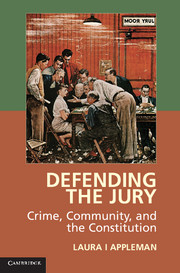Book contents
- Frontmatter
- Contents
- Acknowledgments
- 1 Introduction
- Part I History in the Crucible: Rediscovering the Original Community Right in Criminal Justice
- Part II Old Becomes New: Sixth Amendment Jury Rights and Twenty-First-Century Criminal Procedure
- Part III Theory into Practice: Origins and Community in Modern Criminal Procedure
- 6 Bail, Jail, and the Community Voice
- 7 Infusing Community through Criminal Procedure: The Plea Jury
- 8 Eradicating the Bench Trial
- 9 Restoring the Offender to Society
- 10 Back-End Sentencing: The Sixth Amendment and Post-Prison Procedures
- 11 Jury Nullification and Victim Rights: Going Past Procedure
- 12 Conclusion
- Selected Bibliography
- Index
- References
8 - Eradicating the Bench Trial
Published online by Cambridge University Press: 05 April 2015
- Frontmatter
- Contents
- Acknowledgments
- 1 Introduction
- Part I History in the Crucible: Rediscovering the Original Community Right in Criminal Justice
- Part II Old Becomes New: Sixth Amendment Jury Rights and Twenty-First-Century Criminal Procedure
- Part III Theory into Practice: Origins and Community in Modern Criminal Procedure
- 6 Bail, Jail, and the Community Voice
- 7 Infusing Community through Criminal Procedure: The Plea Jury
- 8 Eradicating the Bench Trial
- 9 Restoring the Offender to Society
- 10 Back-End Sentencing: The Sixth Amendment and Post-Prison Procedures
- 11 Jury Nullification and Victim Rights: Going Past Procedure
- 12 Conclusion
- Selected Bibliography
- Index
- References
Summary
One simple yet meaningful way we can exercise the community jury trial right is by eliminating bench trials. Bench trials occupy an uneasy middle ground in the realm of the jury trial right. Neither a full waiver of the jury trial, such as a guilty plea, nor a carefully regulated criminal procedure such as a full jury trial, the bench trial is a strange beast. As such, it requires a full reevaluation under our new understanding of the community jury right.
Historically, bench trials have been highly disfavored. From the start of the colonial criminal justice system, jury trial waivers were “isolated instances” and “clear departures from the common law.” Indeed, until 1827, the English common law provided only a jury trial option to criminal defendants. Following the adoption of the Constitution, bench trials were virtually unknown. Justice Story, while sitting on a Massachusetts case, contended that trial by jury was the only permissible method of trial. State courts, in interpreting their own constitutions, espoused similar views.
The Supreme Court originally expressed the view that the Constitution required the jury trial to be the exclusive method of determining guilt in all federal criminal cases. By the 1930s, however, the Court rather reluctantly held that a criminal defendant “may forego” a jury trial with the express consent of the government and the court. The Court did note that “trial by jury has been established by the Constitution as the normal and . . . preferable mode of disposing of issues of fact in criminal cases.” Importantly, though, various courts, including the Supreme Court, have held that there is no constitutional right to a bench trial.
- Type
- Chapter
- Information
- Defending the JuryCrime, Community, and the Constitution, pp. 159 - 171Publisher: Cambridge University PressPrint publication year: 2015



